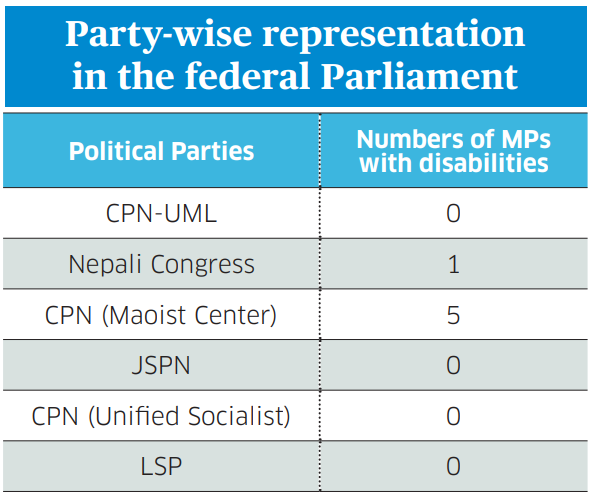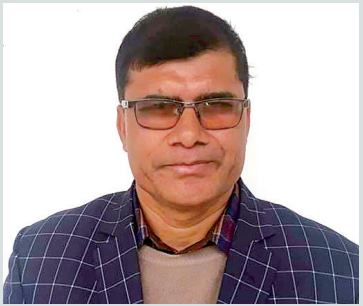Nepali political parties far from inclusive
In line with the inclusive principles enshrined in the Constitution of Nepal 2015, the three major political parties—in their recently held general conventions—included cluster-wise inclusion in their central committees (CCs). Yet while the inclusive principles were applied in selection of lower-level leaders, top positions continued to be in the hands of the traditional elite groups.
In its eighth general convention, CPN (Maoist Center) Chairman Pushpa Kamal Dahal ‘Prachanda’ admitted that inclusion compulsions had prolonged the party’s central committee selection. “Our inclusion system has drawbacks, and it has mostly to do with our policies,” he said before announcing the new central committee. Dahal claimed the party didn’t find a single Muslim woman to be inducted in the CC. The party, however, has tried to include more youths as each gender-ethnicity group has a youth component.
Other political parties have a similar story. CPN-UML has its new cluster named ‘[Kathmandu] valley special’ yet two of the members elected in it were from outside the Kathmandu Valley. The party doesn’t have a single person living with disability in its CC. Nor do any of the major parties have members representing the LGBTIQA+ community.
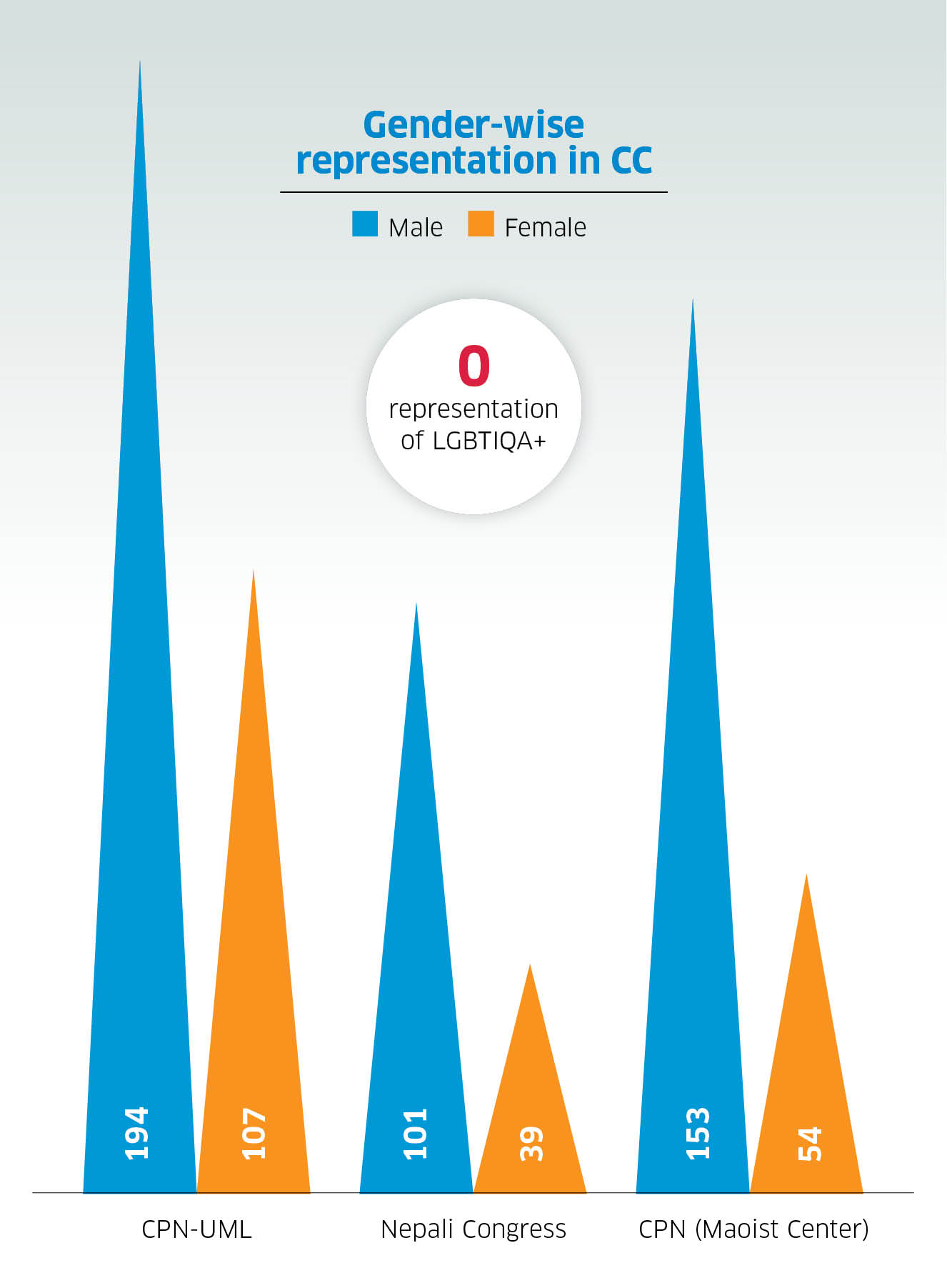
Unlike the Maoist and the UML, the Nepali Congress held elections for the party’s Central Working Committee and the candidacies contending for leadership were in consonance with the clusters. But the inclusion of privileged candidates like Arzu Deuba from the women’s quota, Binod Chaudhary from the Madhesi quota, and Umesh Shrestha from Janajati quota came to be widely criticized.
The conventions also brought many political couples to the respective central committees, which was essentially a triumph of nepotism over inclusion. Reservations and quotas are clearly meant to lift the marginalized groups, not for the elevation of the already dominant groups.
According to the constitution, women are marginalized on a gender basis, Madhesis and Janajatis on a cultural basis, Dalit on a caste basis, and remote areas on a geographical basis, and inclusion should be made proportional to their respective population shares. Therefore, UML should have had at least 100 Janajati members in the CC, as Janajati are 36 percent of Nepal’s population—but that is not the case. All the major parties are led by Khas-Arya males who seem to see inclusion as a danger to their traditional hold over power.
Political elites continue to be exclusionary
Tula Narayan Shah
Political analyst
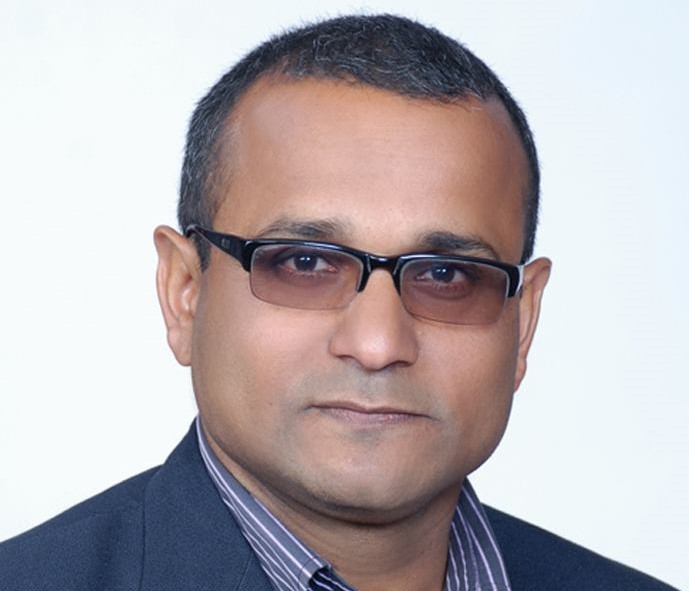
Even after various political movements in Nepal that championed the agenda of inclusion, things have not changed much. During the Panchayat period, Chhetris used to be political party leaders and Brahmins their advisors, now Brahmins are the leaders with Chhetris are right behind them. The tendency is not to recognize leaders from the marginalized groups as national leaders.
Nepal adopted the inclusion policy by relying on the Interim Constitution 2007, which provided for reservation in the bureaucracy, increased electoral constituencies and revised the election process. Yet the state is yet to take ownership of these agenda. Unless the elite class becomes more accommodative, change is difficult, as demonstrated by the recent party conventions. What happened was, basically, those in power used inclusion principles to cement their own hold.
Sugam Pokharel: The ideal Nepali pop culture Idol
Getting an offer for a seat at the Nepal Idol Season 4 judge panel was not a surprise for Sugam Pokharel. The Idol franchise had already approached him in the first season. “I could not work with them back then due to my busy schedule,” says Pokharel.
Yet Pokharel was a household name in Nepali music much before the start of Nepal Idol in 2017. If you grew up in the 2000s and loved music, his ‘Pheri Tyo Din Samjhana Chahanna’ must have been on your playlist. It was a hit from Shoonya, his debut album released in 2000 and the bestseller of that time. But the album’s evergreen songs didn’t come out of the blue.
“My first two songs were commercial failures,” he recalls. Back in 1995, he and Sudin Pokharel, aka DA69, had collaborated on a pair of songs: ‘Ma Maya Garchhu’ and ‘Payera Timilai Yesto Khusi Chhu’. This back-to-back failure made them part ways. Before the release of his solo album, Pokharel changed his stage name to 1MB, in what became a one-man band.
“I never regret those unsuccessful projects that laid the foundation of my musical career,” says Pokharel, a native of Biratnagar. After completing his SLC exams, he had come to Kathmandu with the primary goal of finishing higher studies and applying to go to the US. However, Pokharel ended up pursuing music. It was his elder brother Sunil Pokharel, a veteran theater artist, who helped him at the start of his musical career.
Also read: Namuna Giri: Born to be a poet
In 1997, the time between his failed songs and the first album, Pokharel started working as a librarian in Radio Sagarmatha. He then served as an RJ at the same station for 13 years. Even though he was already a pop star at the time, Pokharel says his association with the radio station changed him as a person, helping him become a better professional at a young age.
His second album, Highway, earned him more fame, with hits like ‘Maya Ko Bato’ and ‘Kati Din Bitey’. Soon, demands for his concert-appearances, from both in and outside the country, went through the roof. “I would perform at three different cities in a single day,” he recalls the days he would perform at Bhairahawa in the morning, Biratnagar in the afternoon, and Kathmandu in the evening. Swyet Hanshini, School Pathshala, Sugam Yatra, Sugam Song Geet, and Sutra are his other albums.
The year 2013, in a way, brought turbulence in his life when he was arrested for using drugs. But he was soon back on track. “In fact, the short break made me evaluate my career and the love of my fans anew,” he says.
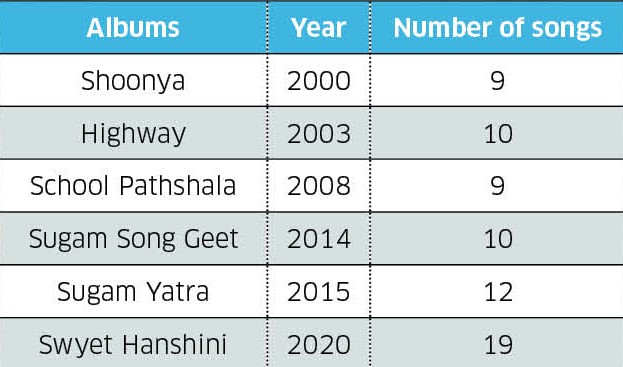
Pokharel had even worked in a tele-serial named ‘Lachhamaniya’ when he was in the seventh grade but had given up on his childhood dream of becoming a movie superstar because of the hassles with retakes. “But I fulfilled my dream to an extent by modeling in my music videos,” he says with a laugh. Besides singles and albums, Pokharel has recorded numerous hits as a playback singer, demonstrating his all-round skills.
These days, he is busy with shows, concerts, and of course, Nepal Idol. “I am enjoying the shoots as our team has good coordination,” he shares the new experience of being in an international franchise show. A long time back, he was also a judge in a reality show called Singing Stars. “I love this platform that helps both the judges and the contestants learn and grow together,” he adds.
Besides Nepal Idol, Pokharel is working on his upcoming album Tilasmi Kathmandu. He says the album will be a tribute to Kathmandu city, which gave him all the things he wanted in his career. He wants to connect with each and every resident of Kathmandu and is currently working on the album’s last song in which he will be using the Newari language.
Pokharel is upbeat about the future of the Nepali music industry. However, he laments some people’s obsession with fame, which will take them nowhere. “To be a successful singer, you just have to practice hard and respect the seniors,” he says.
Dinesh Kumar Thapaliya: Commission ready to hold local elections on April 27
The Election Commission (EC) has expedited preparations for elections of local governments whose tenure expires on May 19. Along with the preparations, the commission is also busy exploring ways to reform the electoral process and formulating an integrated election law. In this connection, Pratik Ghimire of ApEx talked to Chief Election Commissioner Dinesh Kumar Thapaliya.
How are the preparations for local levels going?
On December 24, we met the prime minister and proposed April 27 as a date for local level polls. Even if the date is yet to be finalized, the commission is ready to conduct elections before the expiry of the terms of the 36,000 local representatives on May 19. As of now, we are busy updating voter lists and are in consultation with officials of the finance ministry, security departments, and other concerned bodies.
Are there plans to use the Electronic Voting Machines (EVMs) in the upcoming elections?
The commission is ready to and in favor of using the EVM system, but it is not possible without political consensus. The EC has held talks with them several times but to no avail. Also, to use the EVMs, we have to have mass demo sessions, at least a year before the announcement of election dates. So there is no chance of using EVMs for local level elections, but we still can do it for elections of federal and provincial parliaments, but again, only if there is political consensus.
Also read: Krishna Pokharel: 2021 was a year of disillusionment in Nepali politics
How will this election cycle differ from previous ones?
The election process and voting system have not changed from the previous time, but we are planning to use new technology for surveillance so that elections are more free, fair and peaceful. But primarily, the commission is focusing on civic education, which includes educating the public on the importance of their votes, election-time etiquettes, etc.
What is the progress on a single ‘integrated law’ for all levels of elections?
A few days earlier, the government agreed on the principle of an ‘integrated law’. We will now create a taskforce to prepare related Acts. In two months, we will present the integrated law to the government, which in turn will present it in parliament.
How is the commission planning to curtail excess campaign spending this time?
This time, we are working on an Act that will make it mandatory for candidates to disclose their property details so that the EC can monitor the excesses in their election promotional campaigns. We have also decentralized powers and authorized local election committees to check for adherence to election code of conduct. We appeal to everyone to report any misconduct as only with collective effort can we hold free and fair polls.
Krishna Pokharel: 2021 was a year of disillusionment in Nepali politics
From the dissolution of the federal parliament to its reinstatement by the judiciary, 2021 witnessed many events of historical political importance. ApEx’s Pratik Ghimire talked to Krishna Pokharel, a political science professor at Tribhuvan University, to make some sense of the developments.
How do you recall 2021 in terms of political developments?
The year was hectic, in the sense that there were plenty of political developments, both at federal and provincial levels, in what was a relatively short time. After a long time, people were expecting a stable government that would deliver much-needed development works. But things went the opposite way and for most folks the past year turned out to be a year of disillusionment. As we have a mixed electoral system, there is no alternative to coalition governments and so the parties, in the coming year, should look to build more mutual trust.
What in your view were the top three political events of 2021?
There were many. But if I have to choose the top three, the first would be the unconstitutional dissolution of the House, followed by its reinstatement. Second, even after the restoration, the same party that dissolved the house didn’t let it run so that it could dub its previous step “progressive”. Lastly, the formation of a coalition government of the leftist and democratic forces was another significant development.
Also read: Krishna Khanal: Too early to speculate about future Nepali Congress presidency
Do you think our constitutional bodies functioned well in 2021?
Except for the Public Service Commission and the Office of the Auditor General, no other constitutional body worked well. They rather acted like puppets of the government, not as neutral arbiters and advisors. For instance, the Election Commission gave a timely verdict concerning a vertical split in the Janata Samajbadi Party Nepal but delayed a similar verdict in the case of the NCP, acting as a pawn of the person in power. And now when Sher Bahadur Deuba is in power, it has started favoring him.
How would you review the judiciary’s functioning?
Turmoil in the judiciary showed that when the right people are not in the right place, the organization in question can never deliver. The same judiciary functioned well when Ram Prasad Shrestha was the chief justice. But things are different now due to its new “vulgar leadership.” The judiciary’s head demanding his share in appointments of constitutional bodies, cabinet, and envoys is not something the public expects, thus eroding their faith in the justice system.
What did you take away from the four recent general conventions of major political forces?
Starting with CPN-UML, even if the inauguration was grand, the ending was not-so-impressive as the convention elected a list of party office-bearers handpicked by KP Oli. From the fifth general convention, the party had adopted a democratic practice of electing party officials through election, but Oli destroyed that practice in the eighth GC.
For me, the GC of RPP was just a media hype because even if the party technically has new leadership, there are only two members (one general secretary and the chairman himself) as office-bearers from the Rajendra Lingden team—that’s not an overhaul. The result is a clear tussle between the former king and Kamal Thapa.
Nepali Congress, of course, is a party with a long democratic history. A part of party leadership has continued, but another part has changed. Even if Sher Bahadur Deuba has a majority in the party, there are new and young faces even in his faction. So the general convention of the Nepali Congress is a combo of continuity and change.
The Maoists have come from a different background and, in the party, relations between leaders and cadres are like ones between commanders and commandos. But this party is now gradually adopting democratic ways. They have elected their provincial heads through elections. And we have to see how the public will take self-criticism of Pushpa Kamal Dahal expressed in his political document as that will determine the fate of the CPN (Maoist Center).
Covid-19 in 2021: A year of ‘learning’ for Nepal
The year 2021, in a way, represents another ‘lost year’ for Nepal as all sectors continued to be deeply affected by the Covid-19 pandemic, even though there was a slight reprieve at the year’s end. As soon as the second wave hit in late April, the government, in collaboration with District Administrative Offices, imposed prohibitory orders, with varying levels of restrictions in different districts. From July, the lockdowns were gradually lifted as covid cases declined.
Due to the constant political turmoil, the Ministry of Health and Population had five different ministers in 2021. This also led to a frequent change of officials at health institutions and major hospitals, adding to the difficulties of pandemic-control.
The larger number of daily new cases and lower number of recoveries in May caused an acute shortage of oxygen cylinders, hospital beds, ventilators, ICUs, and other medical supplies. The death rate also spiked, with around 4,000 dying in the month alone. As the second wave’s effects declined, recovery rates, compared to new cases, increased, resulting in only two percent active cases (at the moment).
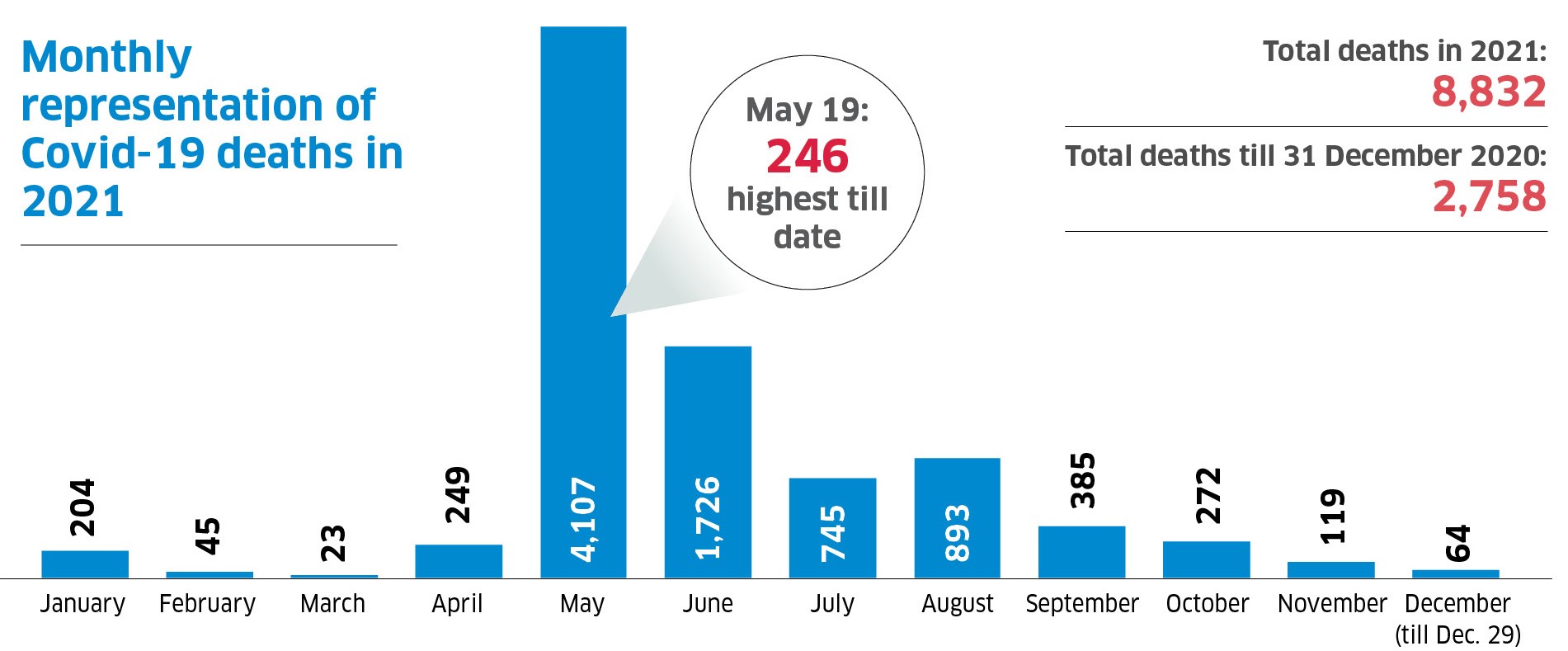
The first-ever set of covid vaccines came to Nepal on 21 January 2021, and people got their first jabs on January 27. The first delivery included a million doses of Oxford-AstraZeneca vaccines provided by India as a grant, while Nepal agreed with Serum Institute of India to buy another two million doses of the same vaccine. But the company later refused to provide the jabs, depriving almost two million people of timely second doses.
Under various vaccine campaigns across the nation, Nepal approved six types of covid vaccines but only four of them—AstraZeneca (India, Japan, Europe), Vero Cell (China), Janssen (US), and Pfizer (US)—are now being used. As of now, over 35 percent of the population of Nepal is fully vaccinated. On November 14, Nepal rolled out Pfizer to children over 12 who also is the first country in the Asia-Pacific region to give covid vaccines to refugees.
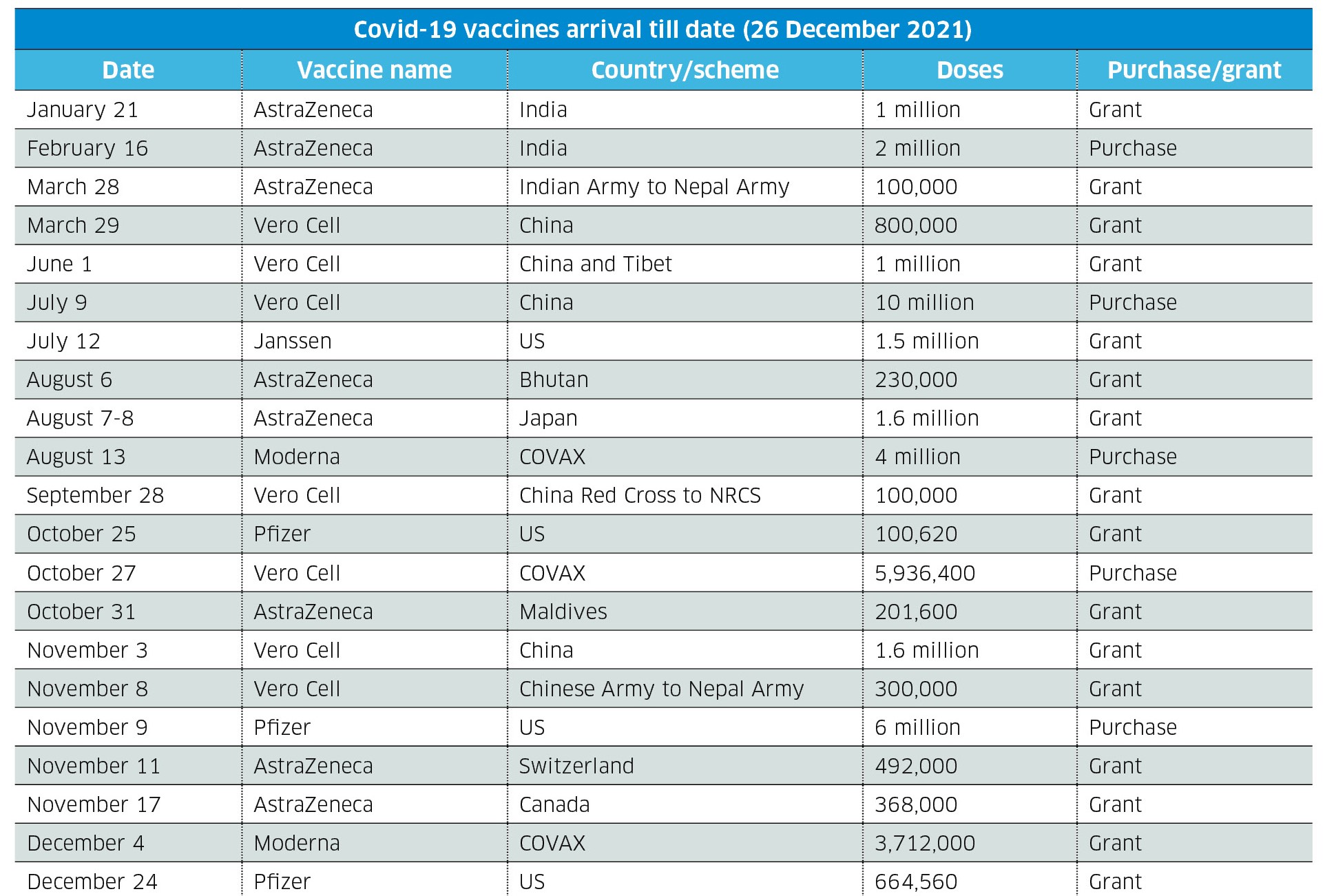
Lately, a new corona variant—Omicron—has been detected. Nepal has so far confirmed three cases of this variant—the first two on December 6 and the third on December 22. The effect of vaccination on this variant is as yet largely unknown. Moreover, a final decision on giving booster doses to the fully-vaccinated population is yet to be taken.
“The year of learning”
Dr Sangita Kaushal Mishra
Spokesperson, Ministry of Health and Population
The Delta variant was not kind to us, yet we have learned many things from this unpleasant covid journey. Everyone knows the areas in which we as a country fell behind, but here I want to focus on the positives.
The year 2021 made us prepared for the next wave—whenever it hits. We have much better medical equipment like ICUs, ventilators, oxygen plants, etc, even at the local level.
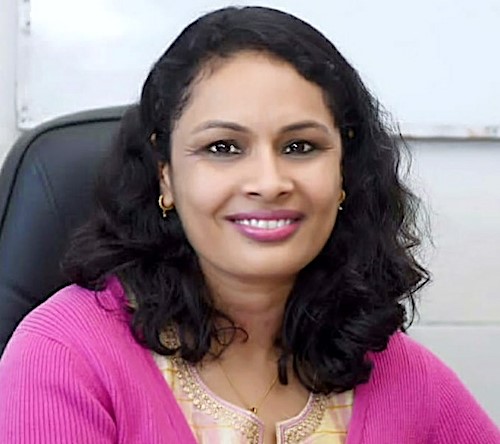
The death of over 8,000 people is something no one wanted. The general public, after the second wave, has been aware of the risks. So there has been a collective effort to minimize the pandemic’s effects. Vaccination started right from the start of 2021 and there has been good progress throughout the year. Even if the Omicron variant has now been detected, we are still, by and large, coping with the Delta variant.
Summing up, 2021 had both positives and negatives but most of all, it was a year of learning for all involved in Nepal’s health sector.
No political party for Nepalis with disabilities
Article 29 of the United Nations Convention on the Rights of Persons with Disabilities (UNCRPD) says, “State parties shall guarantee to persons with disabilities, political and public rights and the opportunity to enjoy them on an equal basis with others.”
Around 15 years after the convention’s drafting, the entire world has lately taken a stand in favor of proportional inclusion and representation for the population with disabilities. Nepal is one of the laggards.
According to the 2011 census, around 1.94 percent of Nepal’s population lives with some form of disability. The preamble of the Constitution of Nepal 2015 talks of building “… an egalitarian society founded on the proportional inclusive and participatory principles to ensure economic equality …” This means, in each sector, two percent of the seats are to be set aside for the persons with disabilities (PWDs).
But have we adhered to the provisions of our constitution and international treaties?
As politics lies at the center of everything, it is worth asking how inclusive this field is when it comes to the PWDs. Not very much, unfortunately.
In the federal parliament of Nepal, of 275 MPs, only two are with disabilities, both from the CPN (Maoist Center). The Maoists have thus provided relatively more seats to the people living with disabilities, but they also consider those injured in the armed rebellion as PWDs. Chudamani Khadka, an MP with a disability due to a bullet injury he sustained during the insurgency, is a long-time personal aide to chairman Pushpa Kamal Dahal.
Teknath Neupane, former chairman of Apangata Sangathan Nepal, a Maoist PWD sister organization, accepts that the party has given more priority to those who sustained injuries during the conflict over those born with disabilities. Injured cadres from the armed revolution who were ready to sacrifice their lives for the party deserve the attention, he says. But, he adds, “They have now gained enough recognition and time has come to start treating all those with disabilities with the same yardsticks.”
Party spokesperson Narayan Kaji Shrestha accepts that those who got disabilities during the conflict climbed the ladder of political leadership faster compared to other PWDs.
A recent standing committee decision, before the party’s national conference, made it mandatory for party units to select at least one person with disability as a delegate to the convention from each local level. “We are strengthening the party from the base-up and ultimately, each will find his or her rightful place in leadership,” Shrestha promises.
In the National Assembly, there are four PWDs—one from Nepali Congress and three from Maoists. Similarly, the seven provincial parliaments, in total, have no more than a PWDs, all from Congress and Maoists. CPN-UML and other parties don’t have a single such provincial lawmaker.
“There are 15 MPs who qualify as PWDs in the country. This number should have been enough to raise our issues in parliaments, but regretfully, only few of them consider themselves PWDs,” says Bhojraj Shrestha, chairman of Rastriya Loktantrik Apanga Sangh, the Nepali Congress sister wing for the person with disabilities.
Shrestha, along with 22 other members, had formed the organization back in 2006, but the party officially recognized it only in 2009.
Says Jagadish Prasad Adhikari, general secretary of Loktantrik Rastriya Apanga Sangathan, a CPN-UML sister organization, who also was a convention representative at the 10th UML General Convention, “My party has neither addressed our issues nor given us a seat on party committees.”
Also read: Nepal struggling to deal with new refugees
During the latest UML general convention, not a single person with disability won a party-leadership position. Of the 12 PWD delegates, five were from the quota of the sister wings. “We didn’t contest as the party asked us for consensus and we respected the policy, but later, we got scammed,” he says.
Newly elected UML Secretary Yogesh Bhattarai says there was no restriction to contest elections. For him, inclusion is a new concept, and it takes time to adapt. “We are discussing separate seats for the person with disabilities in the party’s committees,” he adds. But UML recently published the nominated list of 30 members in the central committee and again, not a single party person with a disability got the nomination. According to Bhattarai, the party is still working to include them besides the central committee.
As the Maoist national conference is around the corner, cadres of its PWD wing are hopeful of more representation in the party. “Our party has shown the way, it’s time to see how they implement the policies,” says Neupane.
Because of poor management, Nepali Congress hasn’t been able to hold its 16 district conventions, barring many deserving party members from filing candidacies. The same happened with Shrestha of the NC sister wing, as he didn’t get to contest for the posts. “Of the six people with disability who are contesting for a seat in the central committee, almost none consider themselves a PWD or part of the disability movement,” he adds with disappointment. “But I am sure they are the ones who will win.”
Debu Parajuli was told by the Rastriya Prajatantra Party that they have no quota for the PWDs. She then filed her candidacy for central committee member from the open category, getting the sixth most votes.
“People with disabilities can stand toe to toe with anyone,” she says. “Quotas are necessary but if you don’t fit into them, please enter the contest from the open category. That I won means that I defeated an ‘able’ person,” Parajuli says.
The other problem is that political parties’ leaderships still don’t deem the person with disabilities good enough for important party posts. Moreover, the PWD quotas are often misused.
Mitra Lal Sharma
President, National Federation of the Disabled-Nepal (NFDN)
Our presence in decision-making is a must
I find it pathetic when people think that our needs and aspirations should be confined to getting wheelchairs and other disability-friendly infrastructure. We are not given leadership positions even when we have the requisite knowledge and skills.
Let’s compete. This is an open challenge to the leaders of mainstream political parties. If the people/team you carry can defeat us with your knowledge, ideology and skills, we are fine with not being included, but what if we win? They need our vote and tax, but not our knowledge. Let me ask our political leaders: What is the required qualification to lead a major political party?
When there is a lack of our participation in policymaking, the problems of the people with disability can’t be addressed as other people do not know about our issues and even if they do, they often don’t bother to speak about them. So our presence in decision-making is a must.
Krishna Khanal: Too early to speculate about future Nepali Congress presidency
The recently-concluded 14th general convention of the Nepali Congress has generated a lot of speculations, particularly concerning the much-desired generational change at the top and the party’s future electoral prospects.
Pratik Ghimire of ApEx talked to Krishna Khanal, political analyst and professor of political science at Tribhuvan University, about the party’s present and future.
How would you evaluate the recent Nepali Congress general convention?
As the party’s membership distribution process is controlled by main leaders, I had thought the final results would reflect a compromise among various factions. But the distribution of votes says the opposite. We can see a strong urge for change. To an extent, this has started a good trend. The election of leaders like Gagan Thapa and Bishwa Prakash Sharma shows what the cadres want.
Only two of the new 13-member office-bearers are old faces. What is the significance of this result?
Your statement is not true. Even as 11 new faces have been elected office-bearers, many of them like Bhishma Raj Aangdambe, Purna Bahadur Khadka and Farmullah Mansur have been near party leadership since the 90s. They are neither new nor represent anything new in the party. So I don’t consider this an indicator of progress.
Also read: Why are Nepali Congress leaders afraid of technology?
Can Sher Bahadur Deuba run the party as per his wishes this time as well?
I guess yes because the president is the executive with all the powers. There will be more dissent than before for sure, but Deuba will be the man to take the final call on important issues. A few voices of dissent will not stop him from doing what he wants. So it’s better to not expect much.
Is it fair to say that Gagan Thapa or Bishwa Prakash Sharma stand a chance to win party presidency come the next general convention?
It would be too early to say that. But it is true that if they can maintain support from voters in the long run, this convention has created a firm foundation for them. Moreover, four years is a long time in politics. How the party performs in the upcoming elections and how the public sees this particular crop of leaders will determine a lot of things.
What in your view were the salient differences between the general conventions of the Nepali Congress and the CPN-UML?
Nepali Congress is an old democratically-run party. So no other party has democratic values comparable to it. The convention was open and tough for candidates, whereas the UML had narrowed down the path to electoral victory by seeking consensus candidates. So these two general conventions can’t be compared.
The other difference is that NC has an inclusive design for office bearers despite its factionalism. The UML was a one-man show. Similarly, NC cadres know who can lead the party in the future but in the UML, it’s just a matter of who KP chooses.
Why are Nepali Congress leaders afraid of technology?
The just-concluded 14th Nepali Congress General Convention will be best remembered for two reasons: the emergence of Shekher Koirala as a serious contender for party leadership—and the ubiquitous green water-tanks that doubled as ballot boxes. People were left scratching their heads as the CPN-UML, the country’s largest party, had only just successfully employed e-voting to elect its leadership in its general convention. If e-voting was good enough for UML, why wasn’t it for NC?
Pratik Ghimire of ApEx talked to Neel Kantha Uprety, former chief commissioner of the Election Commission and researcher on elector finance and governance.
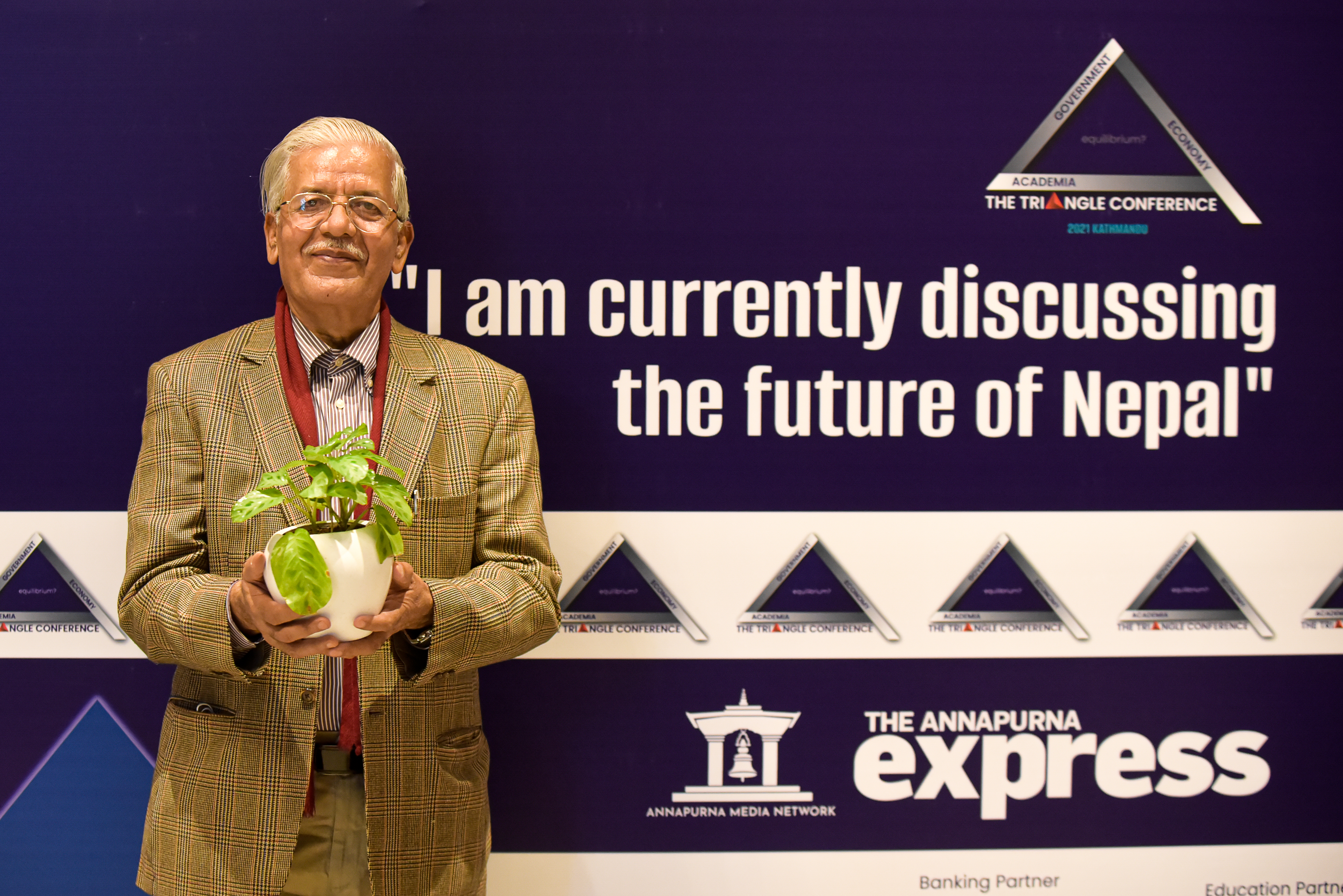
What do you think explains the tech-phobia of Nepali Congress?
Even in the previous UML general convention in 2014, electronic voting had been considered before one of its leaders refused to accept it at the last minute. We tried to convince him, but he would not budge. But this time, the party really did switch to electronic voting. I believe Congress must also have considered using the paperless system, but their conservative beliefs stood in the way. They are afraid of technology. This is akin to counting cash by hand even after getting it counted by a reliable machine.
Is there any other reason behind the NC’s reluctance to switch to electronic voting?
The other reason is that politicians and local hooligans can’t tear ballot papers or manipulate the results if all votes are cast electronically. This might be an unpopular but true reason.
Also read: Rajendra Lingden: No one person or family will direct RPP
Nepal piloted an electronic voting system in one constituency back in 2008, but why didn’t it continue?
We had brought well-working second-hand machines from India. They were good to use, but due to unavoidable technical complications, we had to stop using them. The machines were designed for fewer candidates than we usually have in Nepal. The software was also not designed for the election system in Nepal. We could have worked on it, but nobody cared to do so.
So our conservative politicians are the hurdle, then?
The latest data shows 38 million mobiles are in use in Nepal—which is more than our population. Most people, even the elderly, have started using smartphones. This proves that we are a technology-friendly country but politicians have been halting our progress. They lack interest, belief, and willpower to start something new. These days, the machines can be customized for just about any election . Politicians fear the instant results machines provide.
National elections are around the corner. Could we switch to e-voting by then?
Before switching to electronic voting in the general election, political parties should normalize the use of machines in their conventions. It would help build public trust. In India also, machines were first used by political parties for their internal elections. And we should re-pilot them by deploying them in a few constituencies across the country this time. When the Election Commission can give results with 100 percent accuracy, everyone will accept it, for sure.








